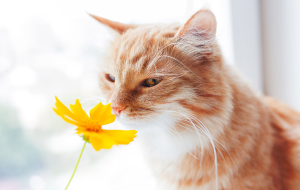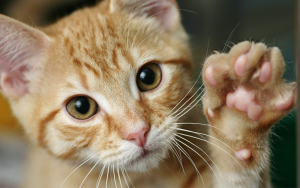Why is My Cat Peeing on My Bed? Understanding and Solving Cat Behavioral Issues

Introduction
If you’ve ever found your cat peeing on your bed, you’re not alone. This frustrating and perplexing behavior is one that many cat owners encounter. While it’s a common issue, it’s important to understand the root causes of this behavior and how to address
it effectively. In this comprehensive guide, we’ll explore the various reasons why cats urinate outside of their litter box, particularly on your bed, and provide actionable solutions to resolve the issue.
1. Health Problems: The First Thing to Rule Out
Before assuming that your cat’s bed-wetting is purely behavioral, it’s essential to rule out any underlying health issues. Medical problems can often be the primary cause of inappropriate urination, including urinating on soft, familiar surfaces like
beds. Here are some common health problems that may lead to this behavior:
1.1 Urinary Tract Infections (UTIs)
UTIs are one of the most common causes of inappropriate urination in cats. Cats with UTIs may urinate more frequently or in inappropriate places due to the discomfort and urgency they feel. If your cat is peeing on your bed, it may be trying to communicate
that it is in pain or feeling stressed because of a urinary infection.
Symptoms to Watch For:
- Frequent urination
- Blood in urine
- Straining to urinate
- Crying while urinating
1.2 Bladder Stones or Crystals
Bladder stones or crystals can also cause discomfort and lead to inappropriate urination. These stones or crystals can irritate the bladder and cause pain during urination. As a result, your cat may urinate in places it normally wouldn’t, such as on your
bed.
Symptoms to Watch For:
- Bloody or cloudy urine
- Straining to urinate or frequent trips to the litter box
- Licking the genital area excessively
1.3 Kidney Disease
Kidney disease is another potential cause of inappropriate urination. As cats age, they become more prone to kidney problems, which can result in increased urination or accidents. Cats with kidney disease may urinate outside the litter box due to an inability
to control their bladder.
Symptoms to Watch For:
- Increased thirst
- Increased urination
- Weight loss
- Lethargy
1.4 Diabetes
Diabetes can also lead to excessive urination. If your cat’s blood sugar levels are uncontrolled, it may drink more water and urinate more frequently, leading to accidents outside the litter box.
Symptoms to Watch For:
- Increased thirst and urination
- Weight loss despite an increased appetite
- Lethargy
2. Stress and Anxiety: Emotional Causes for Urinating on Your Bed
Cats are creatures of habit, and they can become stressed or anxious when their routine is disrupted. Stress and anxiety are major contributors to behavioral issues, including inappropriate urination. When a cat feels unsafe, threatened, or anxious, it
may resort to urinating on soft, familiar surfaces like your bed as a way to mark territory and seek comfort.
2.1 Environmental Changes
Cats are very sensitive to changes in their environment. A new person, a move to a new home, or even the addition of a new pet can cause significant stress. This stress can lead to urination on furniture, including your bed, as a way for your cat to cope
with the changes.
2.2 Loud Noises and Visitors
Some cats are particularly sensitive to loud noises or the presence of unfamiliar visitors. If your cat is startled by a loud noise or feels threatened by a guest, it might react by urinating on a surface it associates with safety, like your bed.
2.3 Lack of Territory Control
Cats are territorial animals, and when they feel that their space is being encroached upon, they may resort to marking their territory. If your cat feels that its space is being invaded, it may urinate on your bed as a way to assert its dominance and
mark the area as its own.
3. Litter Box Issues: The Connection Between Litter and Bed-Wetting
One of the most common reasons for inappropriate urination is issues with the litter box. If your cat is not comfortable with the litter box, it may seek out alternative places to urinate, such as your bed.
3.1 Dirty Litter Box
Cats are fastidious creatures, and they tend to avoid using a dirty litter box. If the box is not cleaned regularly, your cat may decide to relieve itself elsewhere, such as on your bed. Cats generally prefer a clean, fresh-smelling litter box to do their
business.
3.2 Litter Box Size and Type
The size and type of the litter box can also affect your cat’s behavior. If the litter box is too small, your cat may feel cramped or uncomfortable. Similarly, some cats are picky about the type of litter used. If you’ve recently changed the litter brand
or style, your cat may refuse to use the box altogether.
3.3 Multiple Cats in the Household
If you have multiple cats, there may be territorial disputes over the litter box. Cats may refuse to share a box with another cat, and this can lead to accidents around the house. It’s generally recommended to have one litter box per cat, plus one extra,
to prevent such issues.
4. Behavioral Problems: The Role of Training and Habits
Sometimes, urinating on the bed can be a result of behavioral issues or poor training. It’s important to identify whether your cat has developed this habit out of convenience, attention-seeking behavior, or other behavioral triggers.
4.1 Attention-Seeking Behavior
Cats are often creatures of habit, and if they receive attention (even negative attention) when they urinate on your bed, they may learn to repeat the behavior. This can turn into an attention-seeking behavior, where the cat pees on the bed to get your
reaction.
4.2 Marking Territory
Cats often mark their territory by urinating on surfaces. This is especially common if they feel insecure or threatened by changes in their environment, as mentioned earlier. Marking behavior may escalate if your cat feels it is competing for your attention
or space.
5. Solutions to Stop Your Cat From Peeing on Your Bed
Understanding the cause of your cat’s behavior is the first step in solving the issue. Once you’ve determined whether the problem is medical, emotional, or behavioral, here are some effective strategies to stop your cat from urinating on your bed:
5.1 Take Your Cat to the Vet
The first step in addressing inappropriate urination is to visit the veterinarian for a thorough examination. This will help rule out any medical issues like UTIs, bladder stones, or kidney disease. If your cat is diagnosed with a medical condition, following
the prescribed treatment plan should resolve the problem.
5.2 Keep the Litter Box Clean
Ensure your cat’s litter box is always clean and fresh. Scoop the litter box daily and change the litter regularly to make it inviting for your cat. Consider experimenting with different types of litter if you suspect that your cat is picky about the
kind it uses.
5.3 Create a Safe and Calm Environment
Reducing stress is essential in preventing anxiety-related urination. Create a safe and calm environment for your cat by minimizing loud noises, providing a quiet space, and ensuring it has its own territory. Gradually introduce any new people, pets,
or changes to the home, so your cat can adjust without feeling overwhelmed.
5.4 Consider Using Pheromone Diffusers
Pheromone diffusers, such as Feliway, release calming scents that can help reduce anxiety and stress in cats. These diffusers can help soothe your cat and prevent inappropriate urination caused by emotional triggers.
5.5 Reinforce Positive Behavior
Avoid punishing your cat for urinating on your bed. Negative reinforcement can lead to further stress and confusion. Instead, focus on rewarding positive behavior, such as using the litter box, with treats or praise.
5.6 Use Waterproof Bedding
While you work on solving the issue, consider using waterproof bedding or mattress covers to protect your bed from accidents. This will make cleaning up easier and prevent you from feeling frustrated.
Conclusion
Inappropriate urination on the bed is a frustrating issue for many cat owners, but with patience and understanding, it can be resolved. By identifying the root cause—whether it’s a medical condition, stress, or behavioral issue—you can take steps to correct
the behavior. Regular veterinary checkups, a clean litter box, and creating a calm, secure environment will help your cat feel comfortable and prevent future accidents. With a little effort and care, you can restore peace in your home and get your
cat back to using the litter box.







